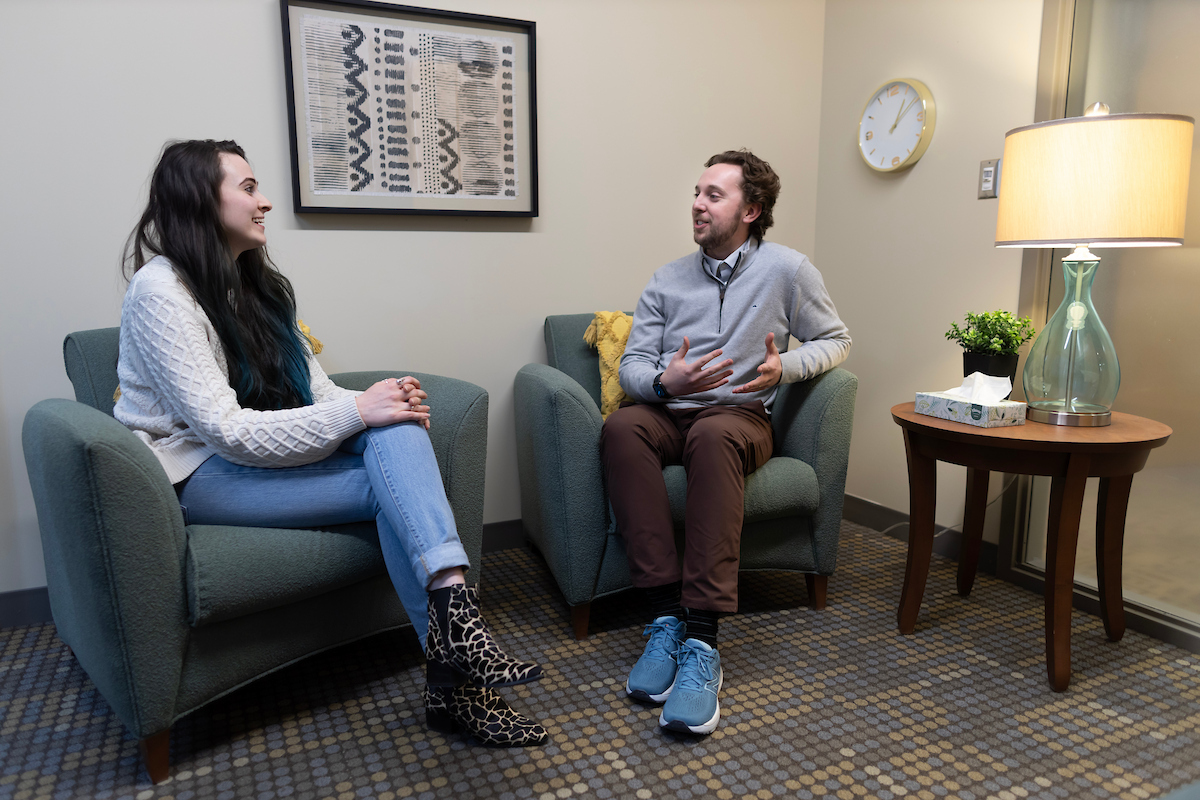Emotional Wellness is our ability to effectively cope with life and its challenges, as well as regulating emotions.
To effectively cope with life’s ups and downs, we must recognize, understand, and manage our emotions. Emotional wellness is not maintaining a positive mood but rather being in tune with our emotions and recognizing that they are valid responses to our experiences and environment.
Being in tune with our emotions helps us to better manage stress and mental health, improving our ability to recover from hardship. Emotional wellbeing means being in tune with our own feelings and recognizing when we require additional support. Continue below to learn what resources UNO has to improve your emotional wellness.

Why Is Emotional Wellness Important?
Emotional wellness allows us to express our feelings and needs. When we can understand and accept our own emotions, it is easier to articulate them to those around us. This helps us to build and maintain healthy, meaningful relationships. The better you feel, the better you perform academically, the more energy you have to socialize, the more energy you have for physical activity, etc. Most importantly, emotional wellness enables us to recognize when we are beyond capacity and are in need of additional support.
Self Check-In
- Do you feel good about yourself most of the time?
- Do you use healthy methods to cope with stress?
- Are you able to ask for help when you need it?
- Do you maintain balance across work, school, friends and family?
For any of the above questions that you answered no to, try to make than an area of focus to improve your Emotional Wellness. If you have answered no to multiple, you may want to have this dimension be a top priority in order to benefit your overall wellbeing.
Where to start?
- Take our self check-in to assess your emotional wellness! A great place to begin is first to understand where you are in terms of your emotional wellness.
- Practice mindfulness. Perform a mental scan of your body from head to toe and take note of how each body part feels.
- Practice self-compassion. Give yourself the same grace and patience you extend to those around you. Remember and recognize that you are trying your best.
- Schedule self-care time for yourself, whatever that looks like for you. Self-care looks different for everyone, so try to find an activity that makes you feel relaxed and gets your mind off stressors.
- Identify your emotions. Keep a journal of how you are feeling and make note of any influences on those emotions, positive or negative.
- Practice self-disclosure. Share your emotions with trusted friends, mentors, family, etc.
Resources to Support Your Journey
- Self-advocacy can be emotionally exhausting. The Accessibility Services Center is here to provide wrap-around support for students and advocate for student accommodations and accessibility needs.
- The UNO Case Management Team oversees the Medical Withdrawals Committee and Process. The university is committed to supporting students who are experiencing a medical condition that interferes with their ability to successfully complete their academic work. The Medical Withdrawals Committee works with students to understand their options and to complete a medical withdrawal if necessary. You can read more about the policy on the Medical Withdrawals Campus Policy website or contact the Medical Withdrawals Committee at medicalwithdrawals@unomaha.edu.
- UNO strives to create a community where open, honest communication is the expectation, not the exception. UNO relies on you to speak up if you believe you have observed unethical, illegal, concerning, or suspicious behavior. Many of the university’s reporting options can be found on the MavsReport website.
- DASH provides several resources to support students in their emotional wellness journey.
- MavMentors, which centers on fostering a thriving environment for academic accountability, professional growth, and peer-to-peer learning.
- Hardship support.
- Community referrals to appropriate resources.
- Resource Guide + Community Partnerships.
- HRL fosters a close-knit community where students live among peers who are experiencing similar challenges, successes, and navigating the transition to college and subsequent adulthood. This environment promotes social interaction and reduces feelings of isolation.
- HRL staff are trained to recognize signs of emotional struggles, distress, and concerns within residents. HRL staff provide support to residents, such as referring students to appropriate services on campus which support students in managing stress, anxiety, or residents with any safety and security concerns that may arise.
- Project Achieve promotes Emotional Wellness through community building, promoting healthy relationships, and events for students to de-stress.
- Welcome Back and Newcomer’s Workshops.
- Peer mentor “fun” events such as...game night, activities with Campus Recreation (Volleyball, Badminton, Kickball, Pickleball, etc.).
- Promoting Project Achieve sponsored student organizations.
- STSE promotes Emotional Wellness by organizing and implementing specific events that help students to cope with stress during prep and finals week. Learn more about STSE programming by visiting their webpage!
- Students involved in UNO Dance Marathon experience Emotional Wellness specific to programming and outreach with Miracle Children and Children’s Nebraska Hospital. Learn more about how to get involved with UNO Dance Marathon by visiting the webpage!
- SLI promotes Emotional Wellness through community building, promoting healthy relationships, and events, for students to de-stress. Interested in improving your Emotional Wellness? Use some of SLI’s resources below!
- Navigating legal situations alone can be challenging. Student Legal Services is here to help students navigate stressful life situations.